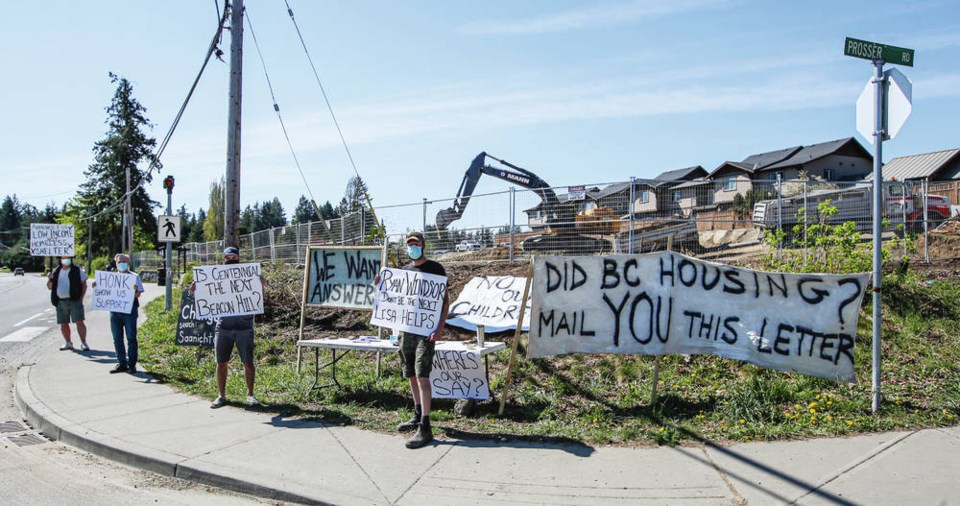A group of neighbours living around a planned supportive housing project in Central Saanich briefly blocked workers from accessing the site Monday, saying they want answers on who will be living there and the services it will provide.
Steve Manchur, who lives near the 39-unit development at 1909 Prosser Rd. with his wife and seven-month-old child, is concerned the province will move people directly from hotels and city parks into the new building. He fears that without proper levels of supports for addictions, the housing development will bring increased crime and drug use into the neighbourhood.
“I play soccer and I’ve done the needle walks at the Crystal Pool field and at Beacon Hill,” said Manchur. “It’s a tough one, and I feel for people who need this.”
Manchur said there is a small park at the end of his road, and he doesn’t want to see the same issues play out there.
The Central Saanich project and a 52-unit development in the 2900-block of Albina Street in Saanich got the green light and $13.1 million in funding late last month through the federal government’s Raid Housing Initiative for 91 permanent homes for the homeless and those at risk of being homeless.
Under the funding rules, the Capital Regional District and B.C. Housing started work immediately and both have to be completed within a year.
David Eby, provincial attorney general and minister responsible for housing, said the province has invoked provincial statutory immunity or paramountcy, which gives the province the right to proceed and allows work on the projects to start immediately without the usual municipal approval process.
“There are multiple levels of frustration for us as neighbours … the province being able to do whatever they want is one of them,” Manchur said. “At this point we just want some answers.
Manchur believes the tight timeline for completion aligns with the province’s leases on temporary sheltering at some Victoria hotels expiring.
“Some, if not all, are addicts and just putting a roof over their head is not the solution,” he said in an email. “There will be more crime and definitely more drugs. We do not have the facilities in the area to aid in their sobriety and recovery, which will lead to more issues.”
In a letter to neighbours on March 24, B.C. Housing said priority would be given to people at risk of homelessness in Central Saanich “who need minimal supports and are ready to move to living independently; many of these people have been living in temporary shelters.”
B.C. Housing said the new housing development will be staffed 24 hours a day and provide wellness checks and life-skills training, and individual assessments would be completed to ensure “a mix of residents with the right supports.”
The agency promised “neighbourhood dialogue sessions” in the coming weeks.
“The rest of the surrounding neighbourhood still believes it is low-income housing, which we are all in favor of,” said Manchur.
“In the letter they say that people at risk of homelessness will be put in the homes, but that is misleading. They are clearly already homeless … they are from tents and hotels downtown.”
Construction on preparing the site continued Monday after eight neighbours carrying signs briefly blocked access.
Central Saanich Mayor Ryan Windsor said he supports peaceful protest in his community, but blocking roadways isn’t the answer.
“I understand there is concern … people are entitled to feel that way,” said Windsor.
He said the property on Prosser Road is zoned for density and the province has full authority on its uses.
“There’s no definition of supportive housing,” he said. “It’s a little different from what the community might have expected. I have fielded calls and am trying to direct people to B.C. Housing, who is directing the process, and encouraging them to submit questions and concerns to Mr. Eby as well.”
Windsor said council will talk with B.C. Housing and other agencies “to reflect the feelings of our community, and we will ask them to broaden engagement with the community.”
dkloster@timescolonist.com



